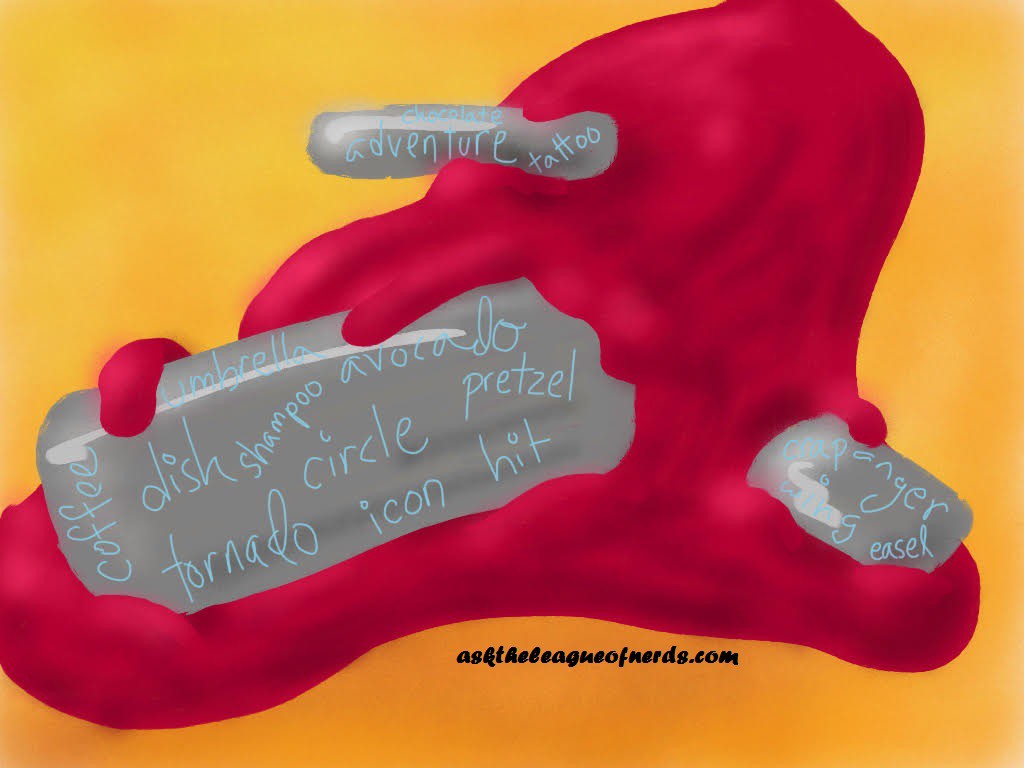What is the plural of conundrum? Conundra or conundrums?
Phil
***
Dear Phil,
So first we are going to talk about loanword integration. Then we’ll hit up Latin in particular. And then, then, there will be a SHOCKING TWIST ENDING. Everybody ready? Let’s roll.
The English language is chock-a-block with loanwords, which might as well be called stolenwords, since we’ve clearly borrowed them with no intent to return. What’s this delicious bread-ring called in Yiddish? Beygl? Nice. “Bagel” is our word now. Tamil-speakers call their spicy sauce dishes kari? Sounds good, we’ll go with “curry.” The Spanish call a watchman a vigilante? Hot damn, that’s a cool word. Definitely coming with us. English is The Blob of languages, rolling over words and absorbing them and swelling ever larger.*

Save us, young awkward Steve McQueen! (drawing by ME, y’all, it took ages)
Depending on how you count,** somewhere from half to three-quarters of English words were loaned in. And all those languages we borrowed from have their own grammar, natch. That includes their own ways of making plurals. If we borrowed the plural system every time we borrowed a word, “bagels” would be bagelekh, “curries” would be curryyyil, and “vigilantes” would… still be vigilantes, actually. Huh.
You get the point, though. Bringing in fifty different ways to show plurals for loanwords from fifty different languages would be hella unwieldy. Besides, when a loanword is brand new to English, it’s noticeable and might hang on to vestigial foreign grammar, but within a couple generations it’s usually absorbed so thoroughly that we use English grammar on it, no problem. The Japanese would never write the plural of “tsunami” with an “-s,” but once we took it in, we integrated it into our own system and it quickly became normal to talk about “six tsunamis.”***
But some loanwords integrate faster than others, and this is where Latin is special. See, starting in the 1500s English speakers entered the Age of Being Super Nuts about Latin, and this Age lasted for four hundred freakin years. Anybody who got to go to school learned Latin; it was expected. So when rediscovered Latin words tumbled into English (and if you are surprised that Latin words were dug up, dusted off, and imported, please review the name of the Age), “how to make plurals in Latin” was relatively widespread knowledge. There wasn’t much reason to integrate them into our usual “-s” plural system, so we largely didn’t.
We didn’t start growing out of this phase until the early 20th century. And we’re still not completely over it. When you see one appendix and two appendices, that’s a Latin plural sticking around. When you see one stadium and two stadiums, that’s Latin being integrated into the normal English system (and Latin-plural stadia getting bounced). When you see one octopus and two octopi, that’s us deciding that “octopus” looks pretty Latin-y and figuring it’s the same cactus/cacti or alumnus/alumni,**** but not caring enough anymore to remember that it’s actually direct from Greek and would’ve been octopodes.
Obviously, this means that conundrum/conundra is one of these Latin words that’s partway through integrating into the English system, right?
Haha, NOPE.
(Are you appropriately shocked?)
Turns out I am not the first person ever to think our obsession with Latin was a little over the top. Way back in the 1590s, in the early stages of developing our collective crush, nerds were already making fun of each other for excessive Latin-love. “Conundrum” is probably – not absolutely 100%, but probably – a joke word coined to make fun of the Latin craze.***** So it never had a real Latin past or a real Latin plural, and most citations for the word, going all the way back to its beginnings, use the plural “conundrums.”
So Phil, the way I see it, you’ve got three options here:
1 – Say “conundrums,” because we speak English, not Latin, dammit.
2 – Say “conundra” and look down your nose at the poor plebes that don’t know their Latin plurals.
3 – Say “conundrums” and look down your nose at the poor plebes that don’t know that “conundrum” isn’t an actual Latin word.
Personally, I’d go with “conundrums.” But whether that’s for reason #1 or reason #3, I ain’t divulging.
Yours,
The Language Nerd
*Though other languages also borrow tons of words from us, which complicates the metaphor. BLOB FIGHT!
**Like, are you including all the medical and scientific terms in English, which are hugely loanwords? Or are you just counting “regular” words? And exactly whose list of “regular” words would that be?
***Well, not TOTALLY normal, I should hope.
****That’s the only Latin word I can think of that you still occasionally see even more forms for: one alumnus, two alumni, then the one-lady alumna and ladies-only alumnae. Maybe they’ve hung on because they’re directly tied to education and managed to draw in the kind of people that get attached to Latin plurals. Bet it ends up being one alumni, two alumnis eventually, though.
*****Not the only time a joke word outlived its humor heyday and went on to be a regular member of our dictionaries: see also “okay.”
Got a language question? Ask the Language Nerd! asktheleagueofnerds@gmail.com
Twitter @AskTheLeague / facebook.com/asktheleagueofnerds
As usual, etymonline and the OED are my etymology sources. Rice U has a nice starter list of words English has borrowed, and Maeve Maddox has a great list of Latin words in English and the current status of their plurals. Here’s a neat site for learning Tamil, if that’s what you took away from this (the writing system is rad). And I returned to David Crystal’s Spell It Out for specifics on the history of English.